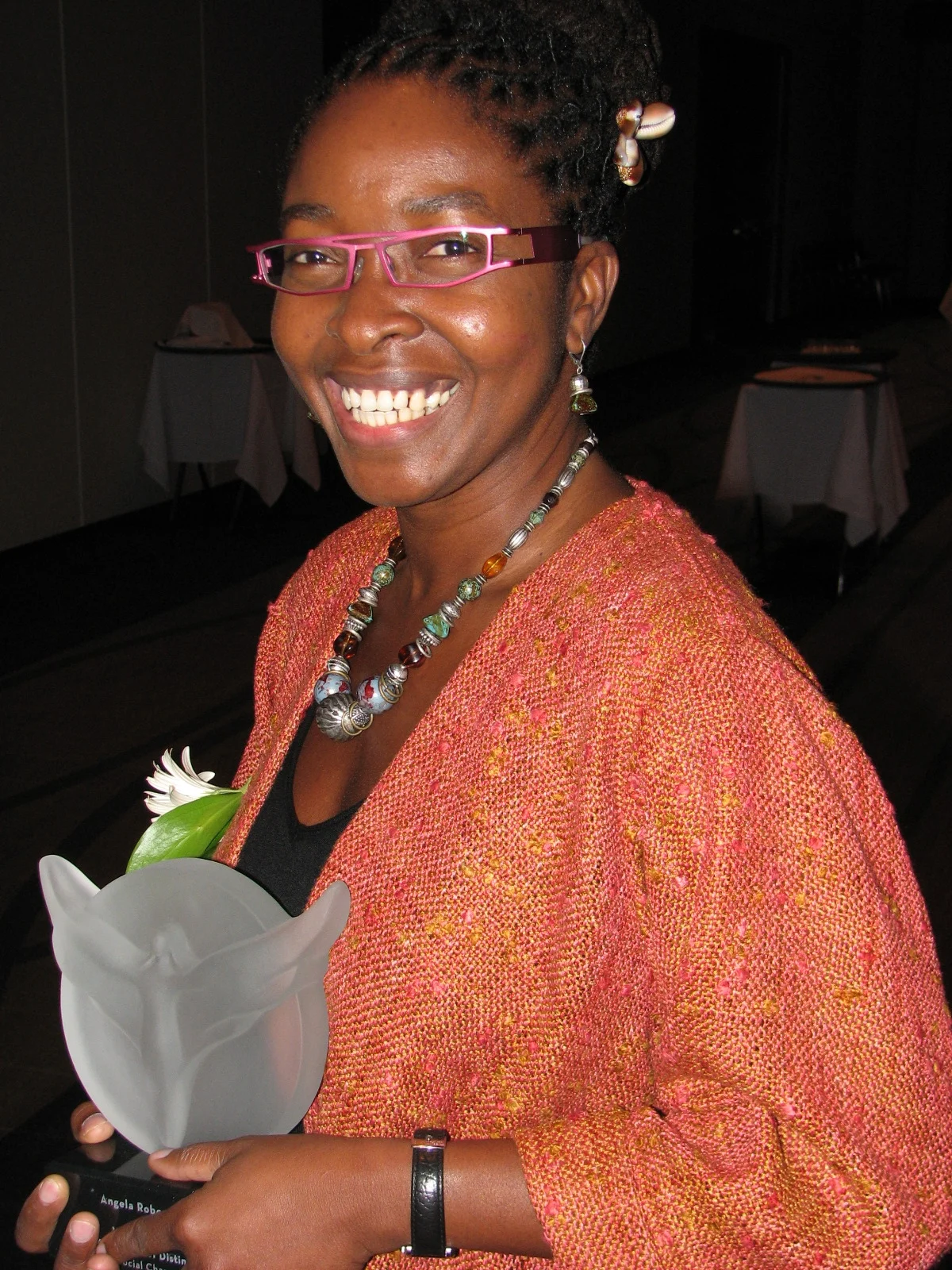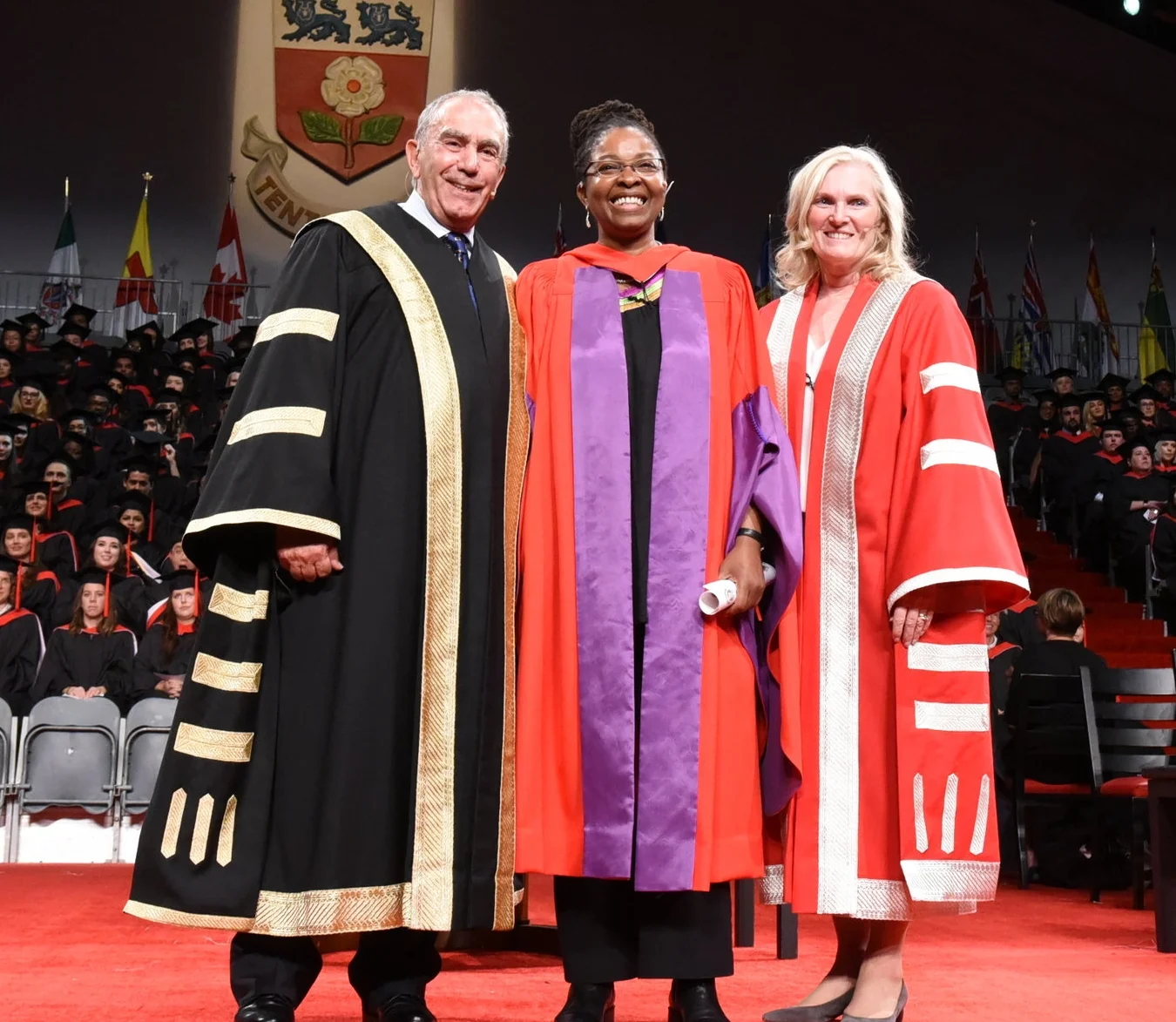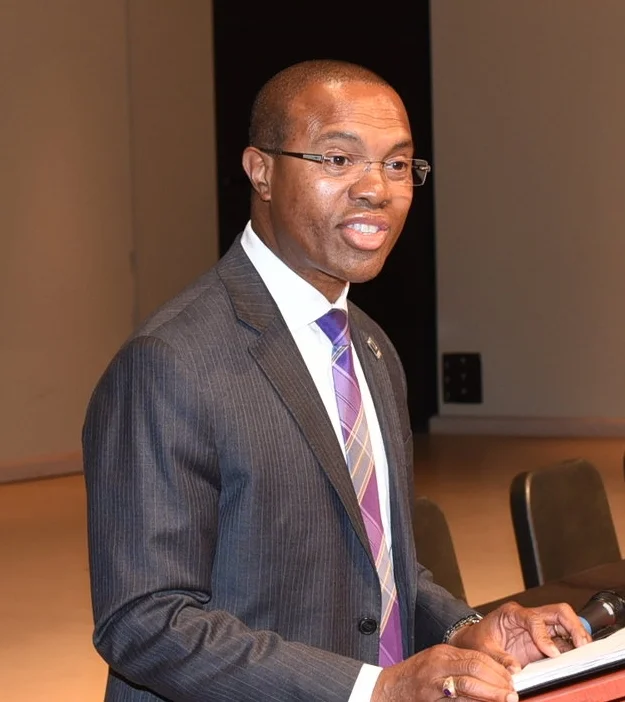Honourary doctorate for Angela Robertson
October 27, 2017
Near the end of her contract as a caregiver under the West Indian Domestic Scheme, Leita Campbell applied for landed immigrant status without her employer’s knowledge.
Upon learning she was successful, he took her to small claims court for the cost of the airfare to come to Canada, medical bills and steak he claimed she ate without his consent.
Campbell, who migrated from Jamaica in 1972, went to court with money and made the payment.
Coming to Canada in 1981 to join her mother, Angela Robertson heard the stories of women’s struggle against exploitative employers who treat caregivers as their personal slaves.
“In hearing and witnessing these struggles, I made a promise to myself that I would sign myself up wherever possible to fight and change those things that devalue women’s lives, low income and working people’s lives and produce poverty, shame, rage and illness, hurt and silence and inequality and injustice,” said Robertson who was conferred with an honourary doctor of laws by York University last week.
The Central Toronto Community Health Centres executive director and her sister grew up in Hanover in the care of their great grandmother, Muriel Harris, and grandmother, Violet Harris.
While graduating with undergraduate and Master’s degrees from York University in 1991 and 1993, Robertson didn’t attend the convocation ceremonies.
“That was because York taught me to rebel against systems and institutions,” she said. “This denied my mother the opportunity to celebrate, so I thank Professor Leslie Sanders and supporters for nominating me for this honourary degree so I could right this wrong…I accept this award for my mom, great grandmother and grandmother and the community of women who nurtured me as a young feminist in the Toronto Black Women’s Collective, and to the men in my life who worked continually to undermine patriarchy. It is important for me in these kinds of gatherings to locate myself as my own history informs my work, my analysis and the impact I want to have on the spaces I occupy and negotiate.”
The graduating class included students from the School of Arts, Media, Performance & Design and the Faculties of Environmental Studies and Liberal Arts & Professional Studies.
“You are getting these degrees at a time of tremendous pressure in the world which manifests itself in the rise and the unmasking of the right, giving way to Islamophobia, xenophobia, anti-black and indigenous racism, the use of the threat of national security by governments as rationalization and justification for the limitation of rights and large scale military intervention to ‘so-call’ keep us in this world safe and to return us to some romanticized notion of the past when we were all safer and stable,” the 2009 YWCA Woman of Distinction awardee for social change, said. “Many of us in this room have lived with instability and insecurity and that is not a romantic notion.
“…You leave armed with your degree at a time when your actions in and/or your inactions will have an impact because there is no neutrality in not interrupting injustice and inequality. You get these degrees when everything around you suggest that you work for your individuals needs to get your piece of the proverbial pie and/or to get rich or die trying.”
Angela Robertson flanked by York University chancellor Gregory Sorbara and president & vice-chancellor Dr. Rhonda Lenton
The former Black Coalition for AIDS Prevention and Nightwood Theatre chair urged the graduates to use their knowledge to push against those sentiments as the stakes are far too high for failure to be an option.
“Hence with your knowledge and the privilege of this degree and these degrees, we must band together to take action – big and small – that will have an impact of creating more equity and justice,” she said. “It is in your interest to fight for a higher minimum wage, the organization of work that reduces precarious working conditions and a social assistance system that enables people to move out of poverty. It is in your interest to support unions and unionization because we know that there is a unionization advantage for racialized and women workers. It is in your interest to push and demand investment in publicly funded educational systems because this is what it can produce.
“It is in our collective interest to fight against cutting or limiting investment in social programs as a way to reduce taxes on the middle-class. It is our collective interest to have equitable immigration and economic trading policies because the low prices of the clothes we wear are directly linked to poor working conditions and low pay received by workers in the global south. Violence against women and girls is in our interest because it says something terrible about the valuing of Indigenous women lives when we have here in this country over 800 recorded murdered and missing women. This warrants more than a government apology. It requires our collective indignation and action.”
Robertson became emotional when speaking about Sanders, a York University professor since 2003, who founded the Centre for the Study of Black Cultures in Canada and has published on Black Canadian writers, including Dr. George Elliott Clarke, Djanet Sears, Dionne Brand and the late Austin Clarke.
Sanders introduced her to Dudley Randall’s ‘The Black Poets’, an anthology of African-American poetry, during a Black Writers course.
“You inspired me to see the value of poetry’s ability to speak succinctly and for the soul about my reality and how poets can paint with words the just world we fight for but cannot see,” Robertson said while fighting back tears.
In presenting Robertson to convocation, Dr. Ananya Mukherjee-Reed, the dean of the Faculty of Liberal Arts and Professional Studies and a political science professor, said the candidate is the type of fighter ‘we yearn to have on our frontlines batting discrimination, poverty and marginalization’.
“She is a passionate feminist leader whose activism and career is focused on community and social justice,” Mukherjee-Reed said. “…A proponent for equity and social justice, she embodies the principles of York University and is an inspiration for all members of society.”
Robertson is widely respected and recognized for implementing life-transforming programs for women in Toronto.
She was the executive director of Sistering – A Woman’s Place which is an organization that offers practical and emotional support to homeless, under-housed and low-income women in the city. With her at the helm, the agency’s budget doubled and funding and community partnerships for two buildings designated as permanent and secure housing for women were secured.
In addition, she was an editorial member of ‘Our Lives’, Canada’s first Black Women’s newspaper produced by The Black Women’s Collective and the Women’s Educational Press managing editor for five years up until 1992. In that role, she gave racialized and queer-identified women representation in the arts and politics through the publication of Canada’s first oral history of African and Chinese Canadian women. She later co-edited ‘Scratching the Surface: Canadian Anti-Racist Feminist Thought’.
“Angela is a community star,” said Ontario Council of Agencies Serving Immigrants (OCASI) executive director Debbie Douglas who attended the convocation ceremony. “She has always been committed to social justice.”
They met at Central Commerce nearly 35 years ago.
“I was in Grade 12 when Angela came to Canada and enrolled in Grade nine,” said Douglas. “The fact that I was a senior and we clicked right away even though she was a junior says as soon as she landed here, she took up space. She has been doing that ever since.”







